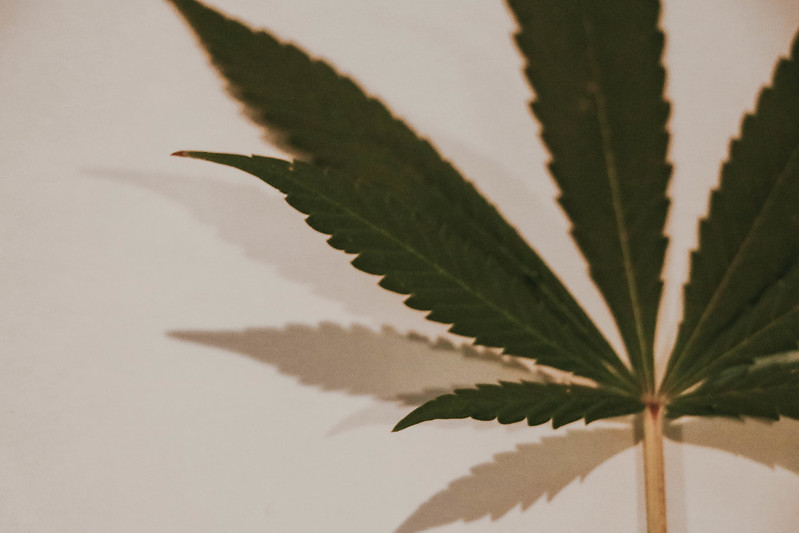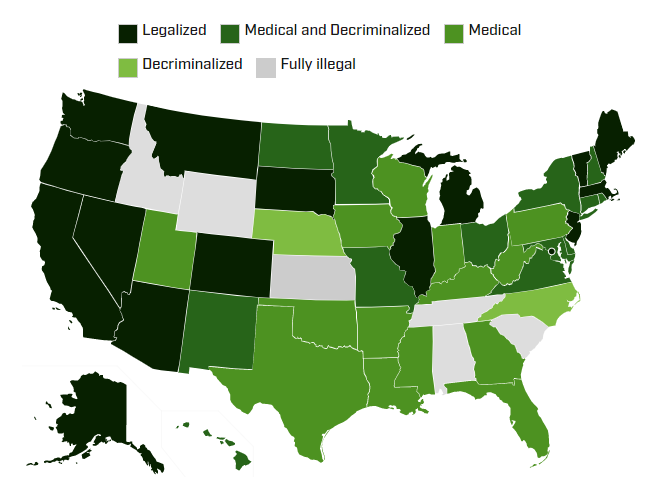|
Marijuana use among seniors is growing fast. According to the Chicago Tribune, between 2015 and 2018, the number of seniors over the age of 65 who smoked cannabis or consumed edibles increased by 75%, making them the fastest growing group of cannabis consumers in America. Even though most states have now legalized personal use to varying degrees there is a lot of confusion regarding marijuana use and its potential medicinal benefits primarily due to the federal governments long standing prohibition on the plant.
Before exploring the ins and outs of cannabis and its potential benefits, it’s important to understand that cannabis contains two main active ingredients, THC and CBD. The most basic explanation is that THC is the psychoactive compound responsible for the high associated with marijuana and CBD is the non-psychoactive compound that’s credited for a wide range of potential therapeutic benefits. Evaluating medical cannabis research specific to any single ailment is not easy since the federal government still classifies cannabis as a schedule I drug which prohibits most research on the topic. Studies in which users report their own experiences outside of a controlled environment sound very promising but there is a disappointing amount of true clinical research available to back up any claims. That being said here is what the anecdotal evidence indicates: Cannabis and Chronic Pain The number one cited reason for medicinal cannabis use is for chronic pain. the National Academies of Sciences determined that adult patients with chronic pain who were treated with cannabis/cannabinoids experienced a clinically noteworthy reduction in pain and they rated these effects as modest. It has been suggested that these compounds may be beneficial in cancer related pain, migraines, fibromyalgia, rheumatoid arthritis, osteoarthritis, and various other types of acute and chronic musculoskeletal pain. Interest in the use of cannabis to treat chronic pain is escalating because of its potential to reduce the need for opioid pain medications. Data from a survey directed by a Michigan medical cannabis dispensary claimed that use of medical cannabis was associated with a 64% decrease in use of opioids. In addition, a recent analysis of prescription data from Medicare Part D enrollees in states with medical access to cannabis suggested a substantial reduction in prescriptions for conventional pain medications. Cannabis and Insomnia Nearly 50% of the adult population in the United States (US) experiences sleeping problems. Considering prescription sleep aids, including antidepressants, benzodiazepines and anti-psychotics, are associated with significant negative side effects and dangerous drug interactions it’s no wonder seniors are seeking alternative sleep aids. A 2016 study among clients at a Colorado dispensary reported that of those who said they were using cannabis to improve sleep, 84% said it was “very” or “extremely” helpful. And 83% of people who reported having used over-the-counter sleep medications in the past were able to either reduce or eliminate those drugs from their routines, when they began using cannabis for sleep. A separate study conducted in 2018 indicates that CBD potency levels were associated with greater symptom relief than were THC levels. Cannabis and Anxiety Many people consider marijuana helpful for anxiety. A 2017 national survey of more than 9,000 Americans found that nearly half of these respondents listed anxiety, stress, and depression relief as a potential benefits. However there also seems to be just as many people who say Cannabis makes their anxiety worse. The difference may be found in the concentration of THC versus CBD in the product with most indications suggesting that a higher concentration of CBD provides the most benefits for those suffering from anxiety. A 2015 review analyzed previous research into CBD oil, stating the vast majority of the research used animal models. However, based on these studies, CBD oil could potentially reduce several anxiety disorders including post-traumatic stress disorder, generalized anxiety disorder, obsessive-compulsive disorder, and social anxiety disorder. Bottom Line Far more research is needed before there are definitive answers on the effectiveness of cannabis to treat these conditions. Anecdotal evidence suggests that there are many potential benefits that can be attributed to cannabis however clinical evidence is lacking. As always it is important to consult your doctor before you begin using any drug to treat your medical conditions especially if you are taking other medications as there is the potential for interactions. When it comes to medical marijuana you and your doctor need to use your best judgment to assess the potential benefits and risks. |
AuthorTyice Strahl Categories
All
Archives
May 2023
|
- Home
-
Settings
- Assisted Living
- Home Care
- Independent Living
- Memory Care
- Skilled Nursing
- Adult Family Homes
-
All Communities
>
- Aspen Quality Care
- Avamere South Hill
- Brighton Court
- Brookdale Nine Mile
- Brookdale Park Place
- Cheney Assisted Living
- Cherrywood Assisted Living
- Colonial Court
- Cornerstone Court
- Evergreen Fountains
- Palouse Country
- Fairview Assisted Living
- Fairwinds
- Fairwood
- Fieldstone Memory Care
- Good Samaritan
- Maplewood Gardens
- Moran Vista
- North Point Village
- Orchard Crest
- Pine Ridge Memory Care
- Emilie Court
- Ridgeview Place
- Riverview Retirement
- Rockwood Retirement Community
- Rose Pointe Assisted Living
- Royal Park
- South Hill Village
- Sullivan Park Assisted Living
- Sunshine Health Facilities
- Touchmark Assisted Living
- Willow Grove
- Wind River
- Alderwood Manor
- Franklin Hills
- Manor Care
- North Central Care Center
- Providence St Joseph
- Regency at Northpointe
- Royal Park Health and Rehabilitation
- Spokane Veterans Home
- The Gardens on University
- Spokane Assisted Living Directory
- Locations
- Services
- About
- Senior Living Blog
- Contact



 RSS Feed
RSS Feed
